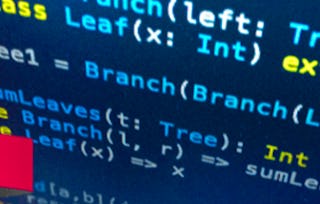Manipulating big data distributed over a cluster using functional concepts is rampant in industry, and is arguably one of the first widespread industrial uses of functional ideas. This is evidenced by the popularity of MapReduce and Hadoop, and most recently Apache Spark, a fast, in-memory distributed collections framework written in Scala. In this course, we'll see how the data parallel paradigm can be extended to the distributed case, using Spark throughout. We'll cover Spark's programming model in detail, being careful to understand how and when it differs from familiar programming models, like shared-memory parallel collections or sequential Scala collections. Through hands-on examples in Spark and Scala, we'll learn when important issues related to distribution like latency and network communication should be considered and how they can be addressed effectively for improved performance.

Big Data Analysis with Scala and Spark

Big Data Analysis with Scala and Spark
This course is part of Functional Programming in Scala Specialization

Instructor: Prof. Heather Miller
102,954 already enrolled
Included with
2,598 reviews
Skills you'll gain
Details to know

Add to your LinkedIn profile
See how employees at top companies are mastering in-demand skills

Build your subject-matter expertise
- Learn new concepts from industry experts
- Gain a foundational understanding of a subject or tool
- Develop job-relevant skills with hands-on projects
- Earn a shareable career certificate

There are 4 modules in this course
Get up and running with Scala on your computer. Complete an example assignment to familiarize yourself with our unique way of submitting assignments. In this week, we'll bridge the gap between data parallelism in the shared memory scenario (learned in the Parallel Programming course, prerequisite) and the distributed scenario. We'll look at important concerns that arise in distributed systems, like latency and failure. We'll go on to cover the basics of Spark, a functionally-oriented framework for big data processing in Scala. We'll end the first week by exercising what we learned about Spark by immediately getting our hands dirty analyzing a real-world data set.
What's included
7 videos7 readings3 programming assignments
This week, we'll look at a special kind of RDD called pair RDDs. With this specialized kind of RDD in hand, we'll cover essential operations on large data sets, such as reductions and joins.
What's included
4 videos2 programming assignments
This week we'll look at some of the performance implications of using operations like joins. Is it possible to get the same result without having to pay for the overhead of moving data over the network? We'll answer this question by delving into how we can partition our data to achieve better data locality, in turn optimizing some of our Spark jobs.
What's included
4 videos
With our newfound understanding of the cost of data movement in a Spark job, and some experience optimizing jobs for data locality last week, this week we'll focus on how we can more easily achieve similar optimizations. Can structured data help us? We'll look at Spark SQL and its powerful optimizer which uses structure to apply impressive optimizations. We'll move on to cover DataFrames and Datasets, which give us a way to mix RDDs with the powerful automatic optimizations behind Spark SQL.
What's included
5 videos2 programming assignments
Earn a career certificate
Add this credential to your LinkedIn profile, resume, or CV. Share it on social media and in your performance review.
Instructor

Offered by
Explore more from Algorithms
 Status: Preview
Status: PreviewÉcole Polytechnique Fédérale de Lausanne
 Status: Free Trial
Status: Free Trial Status: Free Trial
Status: Free Trial Status: Free Trial
Status: Free Trial
Why people choose Coursera for their career

Felipe M.

Jennifer J.

Larry W.

Chaitanya A.
Learner reviews
- 5 stars
72.97%
- 4 stars
21.05%
- 3 stars
4.42%
- 2 stars
0.65%
- 1 star
0.88%
Showing 3 of 2598
Reviewed on Jun 7, 2017
The sessions where clearly explained and focused. Some of the exercises contained slightly confusing hints and information, but I'm sure those mistakes will be ironed out in future iterations. Thanks!
Reviewed on Nov 16, 2017
although spark part is taught nicely, it also takes a lot of time to understand the sql part and remember a lot of sql operations as a zero background man in sql
Reviewed on Jun 5, 2018
Great course about Big Data analysis It was my first exposure to Big Data frameworks and I learned a lot about the problems trying to be solved and the power of Spark.

Open new doors with Coursera Plus
Unlimited access to 10,000+ world-class courses, hands-on projects, and job-ready certificate programs - all included in your subscription
Advance your career with an online degree
Earn a degree from world-class universities - 100% online
Join over 3,400 global companies that choose Coursera for Business
Upskill your employees to excel in the digital economy
Frequently asked questions
To access the course materials, assignments and to earn a Certificate, you will need to purchase the Certificate experience when you enroll in a course. You can try a Free Trial instead, or apply for Financial Aid. The course may offer 'Full Course, No Certificate' instead. This option lets you see all course materials, submit required assessments, and get a final grade. This also means that you will not be able to purchase a Certificate experience.
When you enroll in the course, you get access to all of the courses in the Specialization, and you earn a certificate when you complete the work. Your electronic Certificate will be added to your Accomplishments page - from there, you can print your Certificate or add it to your LinkedIn profile.
Yes. In select learning programs, you can apply for financial aid or a scholarship if you can’t afford the enrollment fee. If fin aid or scholarship is available for your learning program selection, you’ll find a link to apply on the description page.
More questions
Financial aid available,

